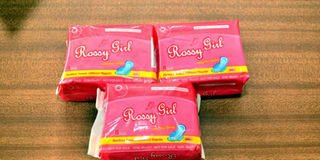Poor Samburu girls use rags as sanitary towels

Some of the government sanitary pads supplied to primary schools. PHOTO | FRANCIS NDERITU | NATION MEDIA GROUP
What you need to know:
- Samburu Girls Foundation Executive Director Josephine Kulea urged the government, donors and well-wishers to help the poor girls and women.
- Dr Kulea said that most parents are poor and cannot afford to buy sanitary towels.
Hundreds of teenage girls in Samburu are using pieces of worn-out clothes and papers as sanitary towels.
Access to sanitary towels is a major challenge for many young girls in the region and Covid-19 has worsened matters for vulnerable families.
According to Samburu Girls Foundation, more than 75 per cent of women and girls in the county cannot afford sanitary towels.
UNTOLD SUFFERING
The foundation’s Executive Director Josephine Kulea revealed that most girls are going through untold suffering and intervention is needed to ease the suffering.
She said that menstruation is often a difficult moment for most girls from remote areas.
She said that most girls across the county depended on public educational institutions, which are now closed, to acquire sanitary towels.
She said that due to high poverty levels in Samburu, most girls find it increasingly difficult to afford sanitary towels.
Dr Kulea said that rags that many girls use are not safe and pose a health threats to the users.
“The rags are not safe for their health. Most rags are dirty and contaminated but the girls opt to use them because they lack recommended towels,” said Dr Kulea.
DONATIONS
She added: "Most of them are going through tough times as schools are closed since they depended on donations. The girls cannot manage their monthly periods safely because families cannot afford to buy them at this difficult period,"
The foundation noted that teenage girls are often stigmatised due to traditional beliefs and cultural practices.
With high levels of poverty that affects more than 70 per cent of population, women and girls are hard hit.
“Coronavirus pandemic has made it impossible to access crucial items such as menstrual products,” she said.
She urged the government, donors and well-wishers to help the poor girls and women.
“These items are as important as foodstuffs and other necessities and the government should consider distributing menstrual products to marginalised areas," she added.
She said that most parents are poor and cannot afford to buy sanitary towels.
“Poverty levels are very high and parents do not even think of sanitary towels. The little amount they get is used to buy food,” added Dr Kulea.




